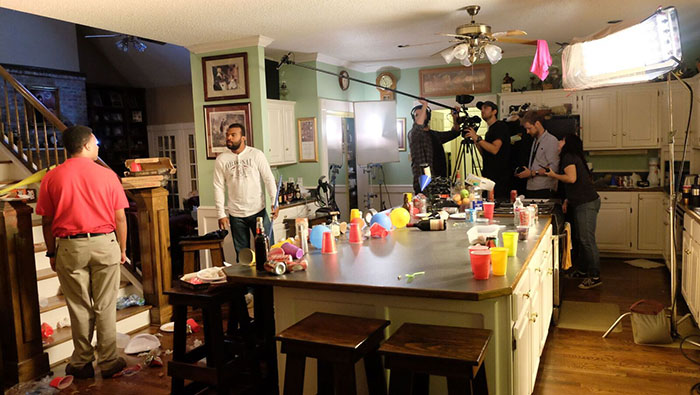
Watch the video interview on Youtube here
Justin Warren, Filmmaker (Then There Was Joe): Okay, next question.
Film Courage: Okay and this is from Iglp3. Here is my question, my name is Chloe. How do you stay the course in spite of the inner negative narrative so many writers deal with that says “everything you make sucks?”
Justin Warren: Man…that’s a good question…Oh! That’s rich, that’s really rich. Oh man!
Film Courage: You’ve got us Chloe.
Justin: Wow! Yeah, I feel like I can speak on this for days. I would say in particular…I don’t want to get too dark here, but I think writing is inherently like the only person you are battling is yourself really (most of the time).
And I think in particular at least for me (I can only speak for my own experience), I struggle a lot with self-hatred. There are lots of parts of myself that I hate. And I am only just now sort of getting over those types of things. But when it’s just you and a blank screen and a cursor flashing sometimes all of your insecurities and bubble up and it gets in the way of you getting your creative thoughts on the page.
And I’ve learned just for me like when I’m able to give myself permission to write the worst, most terrible pages of all time then I can do it. And then in my back pocket I know that writing is process. So I know that whatever I try on my first attempt is probably not going to be very good.
In fact the terrible first draft, that’s just kind of a law in how I see it. There are other people who are brilliant that can pump out a genius first draft, I’m not that person, I will never be that person.
And so for me when I’m allowed to give myself grace and allow myself to write terribly, to just write things that don’t make sense, to write sentence fragments…
“And then they fight…I’ll come back later.”
And then keep going, you know what I mean?

Like when I allow myself that level of freedom, then I can write. I feel like on paper I shouldn’t be a writer because my self-criticism in my brain is pretty fierce and sometimes it’s unbearable. But I think you do, you have to give yourself grace. You have to…I don’t want to be too new-agey but you’ve got to kind of love yourself. I mean you have to be okay with “Yep, these are some terrible words, but you know they are words and that’s all that matters right now.”
In this particular instance, the only thing that matters is putting words on the page, they don’t have to be the right words, they don’t have to be in the right order. And at least for a first draft that’s the thing that when I learned that sort of unlocked in my brain.
It’s like “Oh, this draft doesn’t count. It doesn’t count because I can go back and fix it later.” And so writing with a reckless abandon. Like this doesn’t have to be good. This is supposed to be bad.
Anyone can write a terrible thing, you know what I mean (terrible just in terms of the mechanics of words). Anyone can write something terrible and that’s how I find my entry into it. I know for a fact that I can write something terrible. If my goal is to sit down and be a genius, I can’t hit that every day. But I can hit being really bad every day. And so that’s my only metric of success are there words on the page? Yes. My metric of success is not are they good words, is this good? That’s for later.
Film Courage: I’ve probably mentioned this before but there is this thing called the Dunning-Kruger effect and I’m probably butchering the name of it but I think it’s something to the effect of those who think they are really horrible at something are actually better than most people. I’m not sure I may be butchering this concept but then those who think that “I’m really good at this” they are actually mistaken and it’s this weird duality.
So people who are more (I don’t know if the word is self-effacing) they are actually better than what they think they are doing. So I don’t know, that’s just something that came to mind.
Justin: That kind of makes sense, I think there might be something to that because I think you have to be relatively self-aware (well, I guess you don’t have to be). But I think self-awareness as a writer is a good thing. But self-awareness gone unchecked can be unproductive. But if you can find a mechanism in a way that you can use that as a tool as a way to look at something critically and look at it later critically, that’s a really good skill to have because it allows you to empathize with people which is really all that we’re trying to do in our stories is create empathy between the audience and the characters, that’s all we’re trying to do.
And I think people that might think “I’m terrible at this.” I know I’m in that crowd, I think that can be a strength when used like a tool used in a very calculated way like “Okay, I wrote this thing. It’s really bad. I know it’s bad. How can I make it good?” In that sort of not assuming that you have all the answers I think can open you up to making much more work long term.

Justin Warren and crew on the set of Thentherewasjoe.com
Film Courage: It reminds me of the two characters in ADAPTATION?
Justin: Yeah! Love that movie.
Film Courage: So you see the one character [Charlie Kaufman] played by Nicholas Cage is insecure and you know there is so much he can do but it’s just a matter of what he feels about himself. And the other guy [Donald Kaufman, also played by Nicholas Cage]…
Justin: Is just pumping it out and it like “I think I sold this already?”
Film Courage: Women on both arms, nice cars, nice things and it doesn’t make sense but you see this sometimes in life and you wonder how is that possible? Well I think it’s just someone’s perception of themselves. It’s this weird thing.
Justin: Absolutely. Because if you think you’re terrible you are probably not going to get the words out. And so when I feel like for me I shouldn’t even be a writer because I struggle so much with self-hatred.
But I learned if you just give yourself permission to be terrible, you can do it because everybody can be really bad at something. I think there’s a John Lennon quote where he’s like “I’m a musician, if you hand me a tuba, I’ll get something out of it.” And I’m like “I get that now.” He didn’t say it would be good, he just said I could get something out of this. And I think if we create from that perspective, especially with first drafts and first attempts with things, you really can’t go wrong because anybody can probably get something out of a tuba.
Film Courage: It might hurt your ears at first, but then it would get better.
Justin: It could shatter all the glass in the room, but that’s okay.
Questions For The Viewers: How do you fight off your inner negative narrative?

BIO:
JUSTIN WARREN was born in Little, Rock Arkansas in 1987. He started making movies at the age of eight, making his own stop-motion animated Star Wars films. He graduated from Hendrix College in Conway, Arkansas with a B.A. in Theatre Arts and Dance, where he took the lead in numerous stage plays and won awards for his bold playwriting. In 2008, Justin and his family were featured in the 2008 CNN documentary “Black in America” with Soledad O’Brien which was broadcast globally. In 2014, Justin graduated from the prestigious USC School of Cinematic Arts with an M.F.A. in Film and Television Production. In addition to writing, directing, and co-editing his own films, Justin has also written, performed, arranged, and engineered three albums of original music. In 2018, his first comedy feature film, Then There Was Joe, made its World Premiere at Jeff Nichol’s (Mud, Midnight Special, Loving) Arkansas Cinema Society to sold out crowds. The film is currently screening around the country on the festival circuit and received a glowing review in the L.A. Times, which declared Justin as having a “bright future” in Hollywood. You can visit him online at Justinwarren.me.
CONNECT WITH JUSTIN WARREN:

























